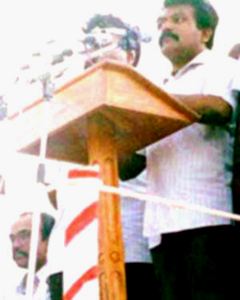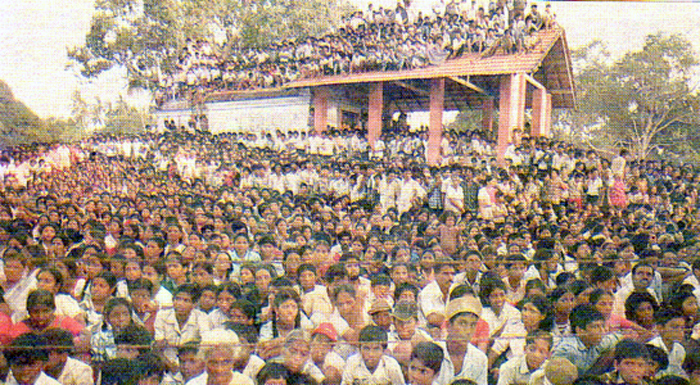Speech by V. Prabakaran at the Suthumalai Amman temple, Jaffna, Sri Lanka, on August 4, 1987.
‘My Beloved and Esteemed People of Tamil Eelam,

V. Prabakaran giving a speech on the Indo-Lanka Accord at Suthumalai on August 4, 1987. [photo courtesy of TamilNation]

Crowd listening to Prabakaran’s speech on the Indo-Lanka Accord at Suthumalai, August 4, 1987. [photo courtesy of TamilNation]
‘The Agreement directly affects the political projects of our liberation organisation; it affects the mode of our struggle; it attempts to put an end to our armed struggle. The mode of our heroic struggle, fought for the last 15 years and built on the blood and sacrifice of our fighters, is to be dismantled in a few days time. This, we cannot digest. This Agreement suddenly disarms us, without providing adequate time, without getting the consent of our fighters, without offering guarantees for the safety and security of out people. Therefore, we refused to lay down arms.‘It was in these circumstances the Indian Prime Minister Rajiv Gandhi, invited me for a discussion. I spoke to him frankly about our problems. I confided to the Indian Prime Minster that I do not repose the slightest trust in the Sinhala racist state nor do I believe that the Sinhalese will implement the Agreement. I spoke to him about the issue of security of our people and the guarantees for their safety. The Indian Prime Minister has given me certain pledges. He has offered to guarantee the security of our people. I trust his sincerity. I have faith in his assurances. We trust that the Government of India will not allow the Sinhala racist state to resume genocidal violence against our people. It is because of this trust we have decided to lay down our weapons to the Indian Peace Keeping force.‘I need not elaborate here the immense sacrifices we have made for the protection of our people. Our people are fully aware of the nature and character of our deep devotion and commitment to the cause. The weapons that we took up and deployed for your safety and protection, for your liberation, for your emancipation, we now entrust to the Indian government. From the very moment we handover our weapons we hand over the responsibility of protecting our people to India. In receiving our weapons from us – the only means of protection for the Eelam Tamils – the Indian government takes over from us the tremendous responsibility of protecting our people. The handing over of arms signifies the handing over, or rather the transfer of this responsibility. Were we not to hand over our weapons we would be placed in a perilous situation of clashing with the Indian army. We do not want that. We love India. We love the people of India. We are not prepared to deploy our arms against Indian soldiers. The soldiers of the Indian army are taking the responsibility of safeguarding and protecting us against our enemy. I wish to emphasise that by the virtue of our handing over our weapons, the Indian government should assume full responsibility for the life and security of every one of the Eelam Tamils.
‘My beloved people, we have no alternative other than to co-operate with this Indian endeavour. Let us offer them this opportunity. However, I do not think that this Agreement will bring a permanent solution to the Tamil question. The time is not far off when the monster of Sinhala racism will devour this Agreement.
‘I have an unshakable faith that only an independent state of Tamil Eelam will provide a permanent solution to the problem of the Tamil Eelam people. Let me make it absolutely clear to you that I will continue to struggle for the cause of Tamil Eelam. The forms and modes of struggle may change but the goal of our struggle will never change. If our cause is to triumph we should have the whole – hearted support of our people. Circumstances might arise for our liberation organisation to participate in the interim government, or in the election for the sake of promoting the interests of our people. But I wish to declare, firmly, that under no circumstances and at any point in time will I ever contest the elections or accept the office of Chief Minister.’